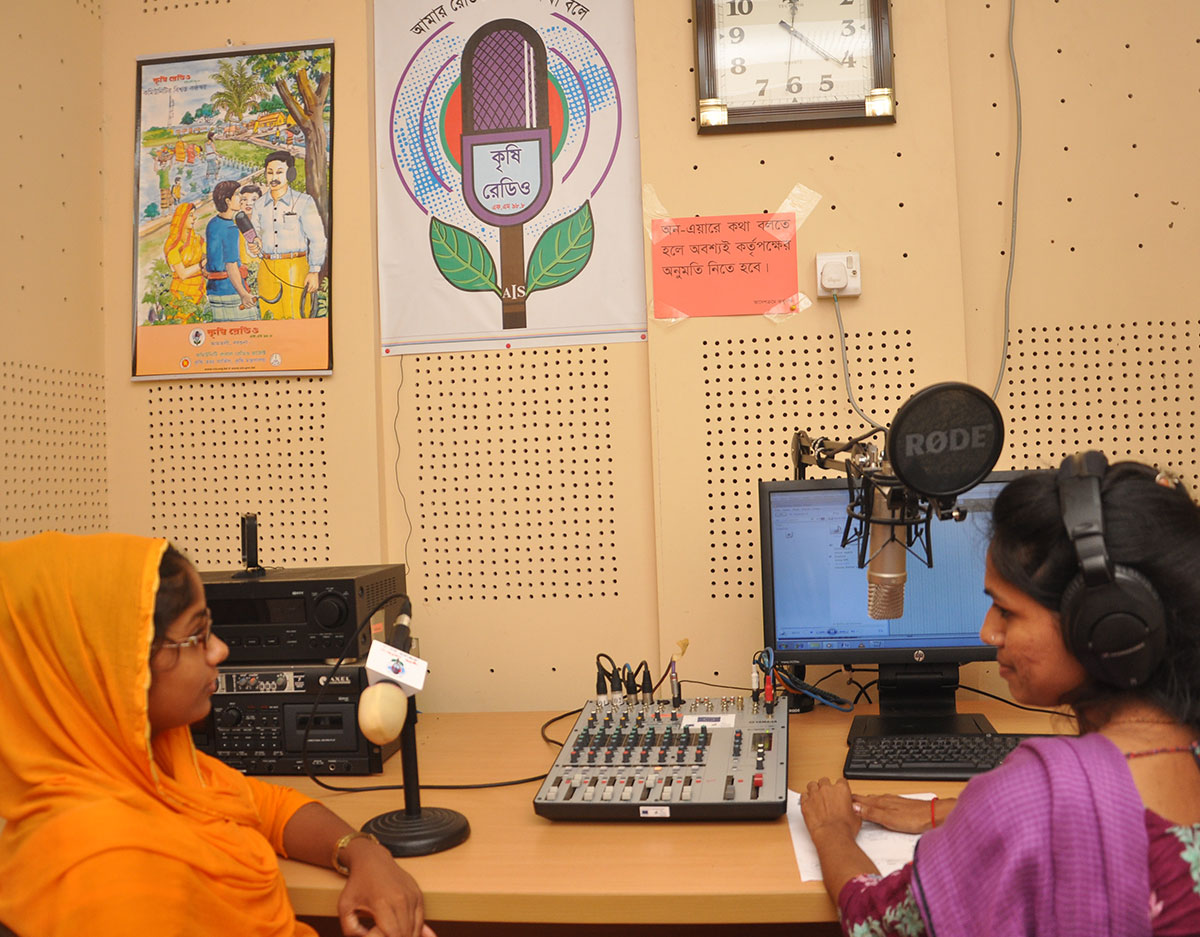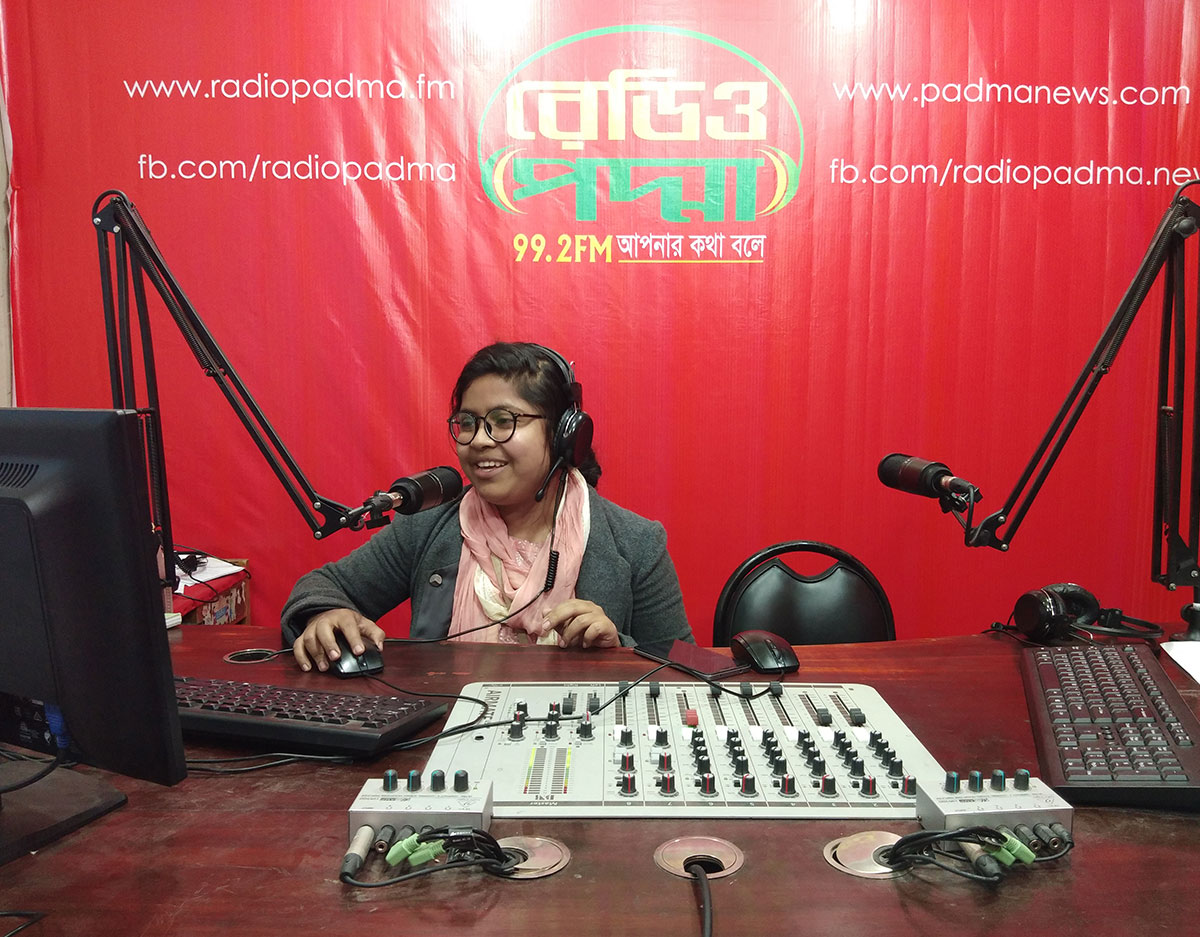Bangladesh NGOs Network for Radio and Communication (BNNRC) has been implemented the project titled Connecting and Empowering Voices for Just, Inclusive and Peaceful Society project supported by Switzerland in Bangladesh
Sustainable Development Goals (SDGs)-16 focuses on inclusive societies, democracy, strong institutions, justice and rule of law. SDG-16 is the key goal and the driver of all other sustainable goals. BNNRC aimed at fostering public debate for sustainable development for a peaceful and inclusive society. There is an intrinsic link between SDG-16 and SDG implementation.
To foster public debate and sensitize stakeholders for the meeting of these issues at the national and community level is very essential. BNNRC has been fostering public debates and sensitizing stakeholders at the national and community level with special emphasis on SDGs localization for a peaceful and inclusive society.
Goal: Enabling Environment to fight against poverty and injustice to contribute to sustainable inclusive development through SDG:16.
Objective: Men and women are empowered and connected to making a just, inclusive, and peaceful society.
Outcome 1: Institutions are engaged in public debate and policy advocacy for a peaceful and inclusive society
Outcome 2: Voice and participation of the youth and vulnerable communities in localization of SDG-16 is enhanced and amplified
Output-1: Institutions are engaged in public debate and policy advocacy for a peaceful and inclusive society
Output -2 Stakeholders enhance their participation and voice on the SDG-16 implementation process
Organization: Bangladesh NGOs Network for Radio and Communication (BNNRC)
Country: Bangladesh
Project description
Fighting against misinformation, disinformation and mal-information through fact-checking become an important challenge.
The goal of the initiative is to Empowering Community People by Promoting Access to Reliable and Timely Information.
The objective was to disseminate reliable and timely information to fight against the issues through Community Radio based on fact-checking using the techniques of information verification before the program broadcast.
The intervention accelerated ICT applications for benefitting community people through effective public access to reliable and timely information through ICT and media for keeping lives & livelihood easy.
The Radio stations with their new technologies and ideas are fighting against the issues. In the age of fast-growing information technology, it is necessary to adopt the techniques of checking genuine facts and learn best practices.
The ability of the community radio is enhanced through the interventions of fact-checking.
Community radio stations deepened their critical understanding of how community media can better serve for fighting against the issue and expanded media environment, and the risks of ‘information disorder’ to the country. Understood the factors that drive trust in community media and how much trust can be sustained or rebuilt. Be able to explain to someone else why community radios are working on the issue.
Implementing partners
- Community Radio Padma 99.2FM, Monafer Morh, Rajshahi,
Email: radiopadma@gmail.com
- Community Radio Nalta 99.2FM, Kaliganj, Satkhira,
Email: info_radionalta@naltahospital.org.bd
- Community Radio Lokobetar 99.2FM, Barguna Sadar, Barguna,
Email: lokobetar@gmail.com
- Community Radio Pollikontho 99.2FM, Matar Kapon, Moulvibazar
Email: pollikontho@gmail.com
- Community Radio Sagor Giri 99.2FM, Shitakunda, Chattogram,
Email: sagorgiri@gmail.com
- Community Radio Mahananda 98.8FM, Belepukur, Chapai Nawabgonj
Email: sm@radiomahananda.fm
- Community Radio Mukti 99.2FM, Maloti Nagar, Bogura,
Email: news.rmfm.bd@gmail.com
- Community Radio Chilmari 99.2FM, Chilmari, Kurigram
Email: radiochilmari@gmail.com
- Community Radio Jhenuk 99.2FM, Pabahati, Jhenidah,
Email: radiojhenuk@gmail.com
- Community Radio Krishi 99.8FM, Amtoli, Barguna,
Email: krishiradioais@gmail.com
- Community Radio Naf 99.2FM, Teknaf, Cox’sbazar,
Email: radionaf@gmail.com
- Community Radio Borendro 99.2FM, Naogoan Sadar, Naogoan,
Email: 99.20fm@gmail.com, info.borendroradio@gmail.com
- Community Radio Bikrampur 99.2FM, Dewbhogh, Munshiganj,
Email: radio@ecbangladesh.org
- Community Radio Meghna 99.0FM, Charfasion, Bhola,
Email: info@radiomeghna.net
- Community Radio Sagardwip 99.2FM, Hatya, Noakhali,
Email: radioshagordwip@gmail.com
- Community Radio Sarabela 98.8FM, Radhakrishnopur, Gaibandha
Email: radiosarabela@gmail.com
- Community Radio Boral 99.0FM, Bagha, Rajshahi
Email radioboral.program@gmail.com, sm@radioboral.org
- Community Radio Saikat 99.0FM, Kalatoli, Cox’s Bazar,
Email: saikatradio@gmail
- Community Internet Radio Voirob, (radiovoirob.net) Khardar, Bagerhat
Email: udayanasad@gmail.com
- Community Internet Radio Dwip (radiodwip.net) Sandwip, Chottogram
Email: radiodwip.ypsa2020@gmail.com
Importance of Partnership
The project was implemented through the partnership with the Community Radio Stations in Bangladesh. The partnership is important to implement any new and innovative ideas and crucial for capacity building for the implementation of any new initiative. Capacity building involves empowering individuals and organizations with the knowledge, tools, and other resources they need to reach their goals. Partners’ support was also important for strengthening skills in achieving goal of the project.
Start date: January 2020
End date: 31st December 2021
Target beneficiary group(s): Target beneficiary group(s) * 1000 Community Radio Broadcasters of community radio, and 9 million listeners of 20 community radio coverage areas of 17 districts of Bangladesh
Other target beneficiary group(s) Multi-stakeholders of the area
Replicability
The project is possible to replicate for all print and electronic media across the country and world. The interventions of fact-checking will contribute to the media of all over the world for benefitting community people in all aspects of life through effective public access to reliable and timely information through ICT and media for fighting against infodemic (Misinformation, disinformation, and mal-information) and keeping lives & livelihood easy.
Community radio has always inspired marginalized people, especially community people to empower them through creating space and sensitized duty bearers through effective public access to reliable and timely information through ICT. The initiative can be replicated in Bangladesh and other parts of the world.
Sustainability
The ability of the community radio is enhanced through the interventions of fact-checking thus they can take the initiative to cope with the practice and respective media houses will adopt the concept through the media. The community radio stations have been incorporated the issues of fact-checking with their regular program and content development and trying to fight against, misinformation, disinformation, and mal-information and avoid them. How this topic has been discussed and shaped by Broadcasters, the news media, and academics. The broadcaster understands how harm and falsity are ways of thinking about ‘information disorder’.
The Broadcasters learned critically about an example of disinformation, breaking down who initiated and created it, what the message looked like, and how it might have been interpreted by audiences. Explain to someone else why it is important that we think about this issue carefully. Increased likelihood of disinformation and misinformation going viral with distribution amplified by ‘trust networks’ and emotional reactions. Critically assess the structural causes and the broad consequences of the news media’s actions in reporting and distributing misinformation. Understand and critique the role of technology and the ‘new gatekeepers’ in enabling the viral distribution of misinformation and disinformation presented as news. Identify emerging best practices within the news industry for catching and combatting misinformation, disinformation, and mal-information.
WSIS values promotion
Through this intervention, WSIS values in Bangladesh are strongly adhered to and promoted extensively. This is done through providing effective public access to reliable and timely information through ICT and media for fighting against misinformation, disinformation, and mal-information and keeping lives & livelihood easy for community people in all aspects of life.
Action Lines and SDGs
WSIS action lines: C-9
Sustainable development goals (SDGs) :
Peace Justice and Strong Institution SDG Goal-16, Quality education-SDG-4, Reduced inequality-SDG-10, Gender Equality-SDG-5, Climate Action-SDG-13, Good Health, and Well-being-SDG-3
Contribution to the implementations of WSIS Action Lines and the Sustainable Development Goals
The project has addressed the Action Line C-9 (Media). Until the introduction of the concept in the Community Radio did not have proper knowledge on fact-checking to fight against misinformation, disinformation, and mal-information in Bangladesh. It is indeed a new topic that BNNRC introduced for Community Radio in Bangladesh. The interventions have generated ideas about fact-checking to fight against misinformation, disinformation, and mal-information in Bangladesh, especially at the grassroots level. Local fact-checking strengthened and networked. Bangladeshi community media learned the skills to produce unbiased, high-quality in-depth reporting and investigations which will ensure effective public access to reliable and timely information for fighting against misinformation, disinformation, and mal-information and keeping lives & livelihood easy of community people in all aspects of life.
The program is facilitating SDG:16 (16:10) promote Peace Justice and Strong Institution, Quality Education-SDG:4, Reduced Inequality-SDG:10, Gender Equality SDG:5, Climate Action SDG:13, Good Health and Wellbeing-SDG:3
The initiative promotes peaceful and inclusive societies for sustainable development, provide access to justice for all and build effective, accountable, and inclusive institutions at all levels, providing access to information and knowledge to people is also important to fostering tolerance between people and contributes to more peaceful societies through promoting Quality Education-SDG:4, Reduced Inequality-SDG:10, Gender Equality SDG:5, Climate Action SDG:13, Good Health and Wellbeing-SDG:3.
Impact
The Community Radio stations with their new technologies and ideas are working for combating fake news, rumors, and misinformation. The claim for evidence concept of fact-checking requires greater analytical depth and skills to broadcast programs to fight against misinformation, disinformation, and mal-information. The intention of Fact-Checking for program Broadcasting needs more insightful, comprehensive, and thus more influential. In the age of fast-growing information technology, it is necessary to adopt the techniques of checking genuine facts and learn best practices in the ethical program.
Deepened their critical understanding of how community media can better serve for fighting against misinformation, disinformation, and mal-information and open societies in a vastly expanded media environment, and the risks of ‘information disorder’ to the country. Understood the factors that drive trust in community media and how much trust can be sustained or rebuilt. Be able to explain to someone else why community radios are working matters.
Challenges and future perspectives for the project
The theme of Fact-Checking to fight against misinformation, disinformation, and mal-information through Community Radio Stations is comparatively new in Bangladeshi media and it would be challenging to introduce the issue to all media.
Mobilizing media on the theme would be a huge task with limited data and information from the ground. The media outlets need to understand more about what causes of misinformation, disinformation, and mal-information. The media need to know where to look for these causes and solutions. Lack of experienced resource persons to train the media is another challenge faced by the media.
The interventions have certainly generated tremendous enthusiasm among the participating community radio which encourages the media outlets to further plan and design how best to extend and expand the ideas among all print and electronic media.
Views on WSIS Stocktaking and Prizes contest:
WSIS Stocktaking and Prize will be an inspiring model to the community radio practitioners in different parts of the world. The winning of the prize will be inspiring to our future Broadcasters and policy-makers.
Photo:




About: BNNRC
Bangladesh NGOs Network for Radio and Communication represents the community media sector to Government, Industry, Regulatory Bodies, Media, and Development Partners.
BNNRC has been struggling for the last 20 years to open up the community media (including Community Radio, Community Television) and giving focus on its vital role as voices of the voiceless rural people. The reality of today is that the bondage between the community people and local-level community radio stations is getting strengthened day-by-day. Community Radio has now become their part of life and livelihood.

